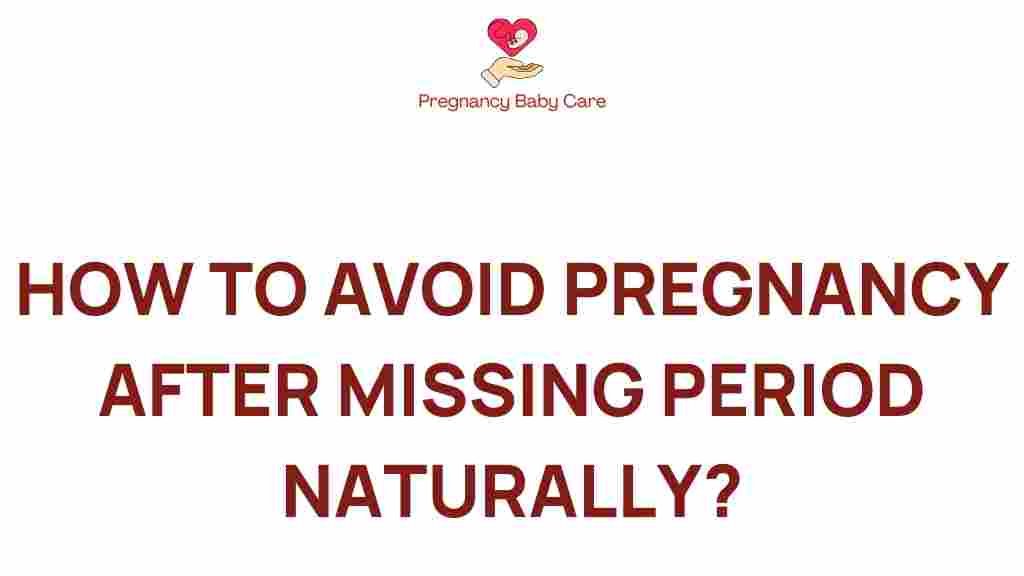Pregnancy After a Missed Period: Natural Methods to Consider
Experiencing a missed period can be a source of stress and uncertainty for many individuals, especially when it comes to the possibility of pregnancy. If you find yourself in this situation and are looking for natural strategies to avoid pregnancy following a missed period, you’re not alone. Understanding your menstrual cycle and exploring natural methods of contraception can empower you to make informed decisions about your reproductive health.
Understanding Your Menstrual Cycle
Your menstrual cycle is a complex process that typically lasts between 21 to 35 days. It involves several phases:
- Menstrual Phase: The shedding of the uterine lining, resulting in menstrual bleeding.
- Follicular Phase: The pituitary gland releases hormones that stimulate the ovaries to produce follicles.
- Ovulation: The release of an egg from the ovary, which usually occurs around the midpoint of your cycle.
- Luteal Phase: After ovulation, the follicle transforms into the corpus luteum, producing hormones that prepare the uterus for a potential pregnancy.
Understanding these phases can help you track your fertility and avoid unintended pregnancy, especially after a missed period.
Natural Methods of Contraception
If you are seeking natural methods to prevent pregnancy, consider the following strategies:
1. Fertility Awareness
Fertility awareness involves tracking your menstrual cycle to understand your fertile and non-fertile days. Here’s how to do it:
- Track Your Cycle: Keep a calendar of your menstrual cycles, noting the start and end dates.
- Monitor Symptoms: Pay attention to physical signs of ovulation, such as changes in cervical mucus, basal body temperature, and ovulation pain.
- Calculate Fertile Window: Typically, the fertile window is 5 days before ovulation and the day of ovulation itself. Avoid unprotected intercourse during this time.
2. Natural Family Planning (NFP)
NFP is a method that relies on understanding and observing your body’s natural signs of fertility. It includes:
- Calendar Method: Predict ovulation based on past cycles.
- Cervical Mucus Method: Observe changes in cervical mucus that indicate fertility.
- Basal Body Temperature Method: Chart your temperature every morning to identify ovulation.
3. Barrier Methods
While not entirely “natural,” barrier methods like condoms can be used in conjunction with fertility awareness for added protection. They prevent sperm from reaching the egg and are also effective in reducing the risk of sexually transmitted infections (STIs).
Health Tips for Family Planning
When navigating family planning and avoiding pregnancy after a missed period, consider these health tips:
- Stay Informed: Educate yourself on your reproductive health and available methods of contraception.
- Consult a Professional: Speak to a healthcare provider or a family planning counselor to discuss options that are right for you.
- Maintain a Healthy Lifestyle: A balanced diet, regular exercise, and adequate sleep can regulate your cycle and improve overall reproductive health.
- Stay Relaxed: Stress can affect your menstrual cycle. Practice stress-reduction techniques like yoga, meditation, or deep breathing.
Step-by-Step Process to Avoid Pregnancy
Here’s a step-by-step guide to help you navigate the unknown after a missed period:
- Confirm Your Missed Period: Use a home pregnancy test to rule out pregnancy if your period is late.
- Identify Your Cycle: Track your menstrual cycle to understand when you are most fertile.
- Utilize Fertility Awareness: Start monitoring your body’s signs of fertility, like basal body temperature and cervical mucus.
- Practice Safe Intercourse: If you wish to avoid pregnancy, consider using barrier methods during your fertile window.
- Consult with a Healthcare Provider: Discuss your situation and the best natural methods for you.
Troubleshooting Common Issues
While practicing natural contraception methods, you may encounter some challenges. Here are some troubleshooting tips:
- Irregular Cycles: If your cycles are irregular, it may be harder to predict ovulation. Consider using ovulation predictor kits or consult a healthcare provider.
- Difficulty Tracking Symptoms: If you struggle to identify signs of fertility, keep a detailed journal of your symptoms and patterns over several cycles.
- Stress and Lifestyle Factors: If stress is impacting your cycle, focus on relaxation techniques and seek support if needed.
When to Seek Professional Help
If you consistently miss periods or suspect underlying health issues, it’s important to consult with a healthcare professional. They can provide guidance tailored to your health needs and help you understand your fertility status.
Conclusion
Navigating the unknown after a missed period can be daunting, but understanding your body and utilizing natural methods of contraception can empower you in your family planning journey. By tracking your menstrual cycle, monitoring your fertility signs, and practicing safe intercourse, you can effectively avoid unintended pregnancy.
Remember that reproductive health is a personal journey, and it’s essential to find the methods that work best for you. For more information on family planning and reproductive health, consider visiting this helpful resource or consulting a healthcare professional.
This article is in the category Pregnancy and created by PregnancyBabyCare Team
